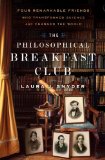
Four Remarkable Friends Who Transformed Science and Changed the World
by Laura J. Snyder
The Philosophical Breakfast Club is a rich work of biography and history in the tradition of Richard Holmes's bestselling The Age of Wonder. Laura Snyder, an expert on Victorian science and culture, has written what is, in a sense, a sequel to Holmes's book, showing how a small group of men working in the early nineteenth century made a number of significant discoveries and, together, brought about a scientific revolution.
The four principles--Charles Babbage, John Herschel, William Whewell, and Richard Jones--are relatively unknown today though their signal achievements are remembered. Charles Babbage was a mathematical genius who invented the modern computer; John Herschel mapped the Southern Hemisphere and contributed to the invention of photography; William Whewell not only invented the word "scientist" but also found the fields of crystallography, mathematical economics and the science of tides; Richard Jones shaped the science of economics.
The four principals of the "Breakfast Club" met as undergraduates at the University of Cambridge in 1812. The Philosophical Breakfast Club tells the story of these extraordinary men, exposing the political passions, religious impulses, friendships, rivalries, and love of knowledge—and power—that drove them.
Drawing upon the voluminous correspondence between the four men over the fifty years of their campaign, the book shows how friendship worked to spur the men on to greater accomplishments, and how it enabled them to help create the modern world, in which science plays a starring role.
"Each of the four figures is a worthy subject in his own right, and by combining their stories Snyder provides the right balance of biography and science." - Publishers Weekly
"The author skillfully weaves together the lives of her four principals with the science of their day." - Kirkus Reviews
"Snyder weaves a compelling, if occasionally meandering, tale of the transformation of science in the Victorian era....she leaves the reader with an inspiring sense of just how influential these men were in shaping our world and laying the foundation for major science and technological changes, especially in three different areas." - The Daily Beast
"In The Philosophical Breakfast Club she draws an endearing - almost domestic - picture of four scientific titans, and shows how - through their very 'clubbability' - they created the scientific basis on which the modern world stands." - Judith Flanders, author of Inside the Victorian Home
"The four busy geniuses who inhabit Laura Snyder's wonderfully engaging book did not invent friendship or science, but by combining those pastimes in their 'philosophical breakfasts,' they managed to invent much else, from the very word 'scientist' to versions of the computer and the camera." - Joyce E. Chaplin, James Duncan Phillips Professor of History, Harvard University
"By tracing the careers of the four members of the Philosophical Breakfast Club,
Laura Snyder has found a wonderful way not just to tell the great stories of 19th-century science, but to bring them vividly to life." - Tom Standage, author of A History of the World in 6 Glasses
"In this elegantly written book, Snyder has brought to life four of the most important British scientists of the first half of the nineteenth century…[She] tracks the intertwined lives of these four figures...while casting light on every facet of British science during their lifetime." - Bernard Lightman, Professor of Humanities and Director, Institute of Science and Technology Studies, York University
"Who would not want to be invited to breakfast with the young philosophers and scientists that Laura Snyder portrays so vividly and with searching imagination?... Science and the personalities who created it spring to life in Snyder's compelling biographical depictions." - Robert J. Richards, Morris Fishbein Professor of the History of Science, University of Chicago
This information about The Philosophical Breakfast Club was first featured
in "The BookBrowse Review" - BookBrowse's membership magazine, and in our weekly "Publishing This Week" newsletter. Publication information is for the USA, and (unless stated otherwise) represents the first print edition. The reviews are necessarily limited to those that were available to us ahead of publication. If you are the publisher or author and feel that they do not properly reflect the range of media opinion now available, send us a message with the mainstream reviews that you would like to see added.
Any "Author Information" displayed below reflects the author's biography at the time this particular book was published.
An expert on Victorian science and culture, Fulbright scholar Laura J. Snyder is also the president of the International Society for the History of Philosophy of Science. She is an associate professor of philosophy at St. John's University and the author of Reforming Philosophy: A Victorian Debate on Science and Society. Visit Laura on Facebook.
Your guide toexceptional books
BookBrowse seeks out and recommends the best in contemporary fiction and nonfiction—books that not only engage and entertain but also deepen our understanding of ourselves and the world around us.